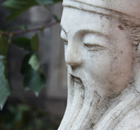Foreign and Military Affairs
Vote unlikely to affect Sino-US ties
By Tan Yingzi, Ariel Tung and He Wei (China Daily)
Updated: 2010-11-03 08:08
 |
Large Medium Small |
White House will continue to wield power in foreign affairs
WASHINGTON/BEIJING - The United States midterm elections on Tuesday will likely to have a profound effect on its domestic policies, but will herald only a slight adjustment of attitude toward China on heated topics such as currency and trade issues, experts say.
As of press time, a Wall Street Journal/NBC News poll indicated the Republicans will gain votes needed to wrest control of the House, while making some gains in the Senate.
But the poll also showed the GOP (or Grand Old Party, as the Republicans are also known) is not likely to overtake the Democrats in the Senate.
US midterm elections are held two years after presidential elections that take place every four years. This year, all 435 seats at the US House of Representatives and 37 of the 100 seats in the Senate are being contested in the election.
The Democrats won overwhelmingly in the 2006 and 2008 elections, controlling both Congress and the White House.
The current landscape, however, has been overshadowed by widespread disillusionment with President Barack Obama for his perceived inability to jumpstart a foundering economy.
Consequently, the election results could well determine the effectiveness of the remainder of Obama's presidency.

The Republicans have repeatedly pledged to put "create jobs, cut taxes and shrink government" as their governing agenda. Should the Republicans take over the House, they are expected to roll back healthcare reforms, renew tax cuts for wealthy Americans, and reverse the Democrats' already stalled drive for comprehensive climate control legislation.
But any policy changes are not confined to strict, traditional bipartisan competition this year as the rise of the conservative Tea Party movement has added a new element to the election cycle.
The inexperienced Tea Party candidates, moreover, are likely to erode part of the Democrats' political power owing to overlapping opinions with the Republicans.
This year's pre-election campaign featured an unprecedented focus on China, when both the Democrats and the Republicans started war of words on yuan's appreciation and trade deficit to try to seek an edge over each other
Analysts said Capitol Hill is unlikely to make major adjustments with respect to Sino-US relations.
"A Republican-controlled congress will permit Republican committee chairmen to call hearings and subpoena witnesses from the Obama administration - often with less than friendly ambitions for the hearings," said Douglas Paal, vice-president for studies and a senior associate at the Asia Program for the Carnegie Endowment for International Peace in Washington.
The House Ways and Means Committee, which has held four hearings on the currency issues recently and has been pressing the administration to take a tougher position, Paal told China Daily, is thus likely to be friendlier toward free trade agreements than the Democratic leadership.
Though Republicans cannot directly affect White House's China policy, their influence will still be "indirect but significant", Paal said.
Derek Scissors, a trade expert from the Heritage Foundation, a conservative Washington think tank said if the Republicans gain more power in the two chambers, there will be less emphasis on currency while other issues - such as the protection of State-owned enterprises - will be magnified.
Tao Wenzhao, a scholar on US studies at the Chinese Academy of Social Sciences, said China and the US are likely to reach some consensus on currency issues after the Group of 20 Summit.
In this respect, he added, the role of the Congress will remain limited.
The potential Republican dominance will further complicate the Taiwan question, as "historically the GOP is always pro-Taiwan", he said.
Other experts, such as Orville Schell, the Arthur Ross Director of the Center on US-China Relations at the Asia Society, meanwhile, said a Republican majority in the two chambers may be a cause for concern, given the degree of uncertainty that currently prevails in US politics.
However, analysts do not think the election will seriously affect China-US relations.
Elizabeth Economy, a CV Starr senior fellow and director for Asia Studies at the Council on Foreign Relations, said there are very few opportunities for Congress to play a significant role in Sino-US affairs, and that despite "the noise surrounding China's currency and trade policies", she doubts any drastic measures taken by the new Congress.
Since the Senate exerts a bigger influence than the House on diplomatic affairs, "there is high likelihood that foreign policy will still be within the firm grasp of Obama - whatever the result is", said Shi Yinhong, a senior scholar on US studies at the Beijing-based Renmin University of China.
Yu Yang contributed to this story.












